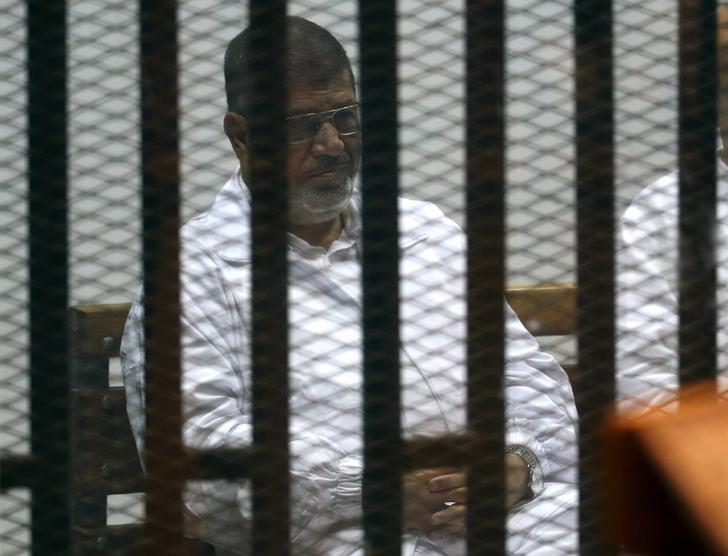Latest NEWS
- Aswat Masriya, the last word
- Roundup of Egypt's press headlines on March 15, 2017
- Roundup of Egypt's press headlines on March 14, 2017
- Former Egyptian President Hosni Mubarak to be released: lawyer
- Roundup of Egypt's press headlines on March 13, 2017
- Egypt's capital set to grow by half a million in 2017
- Egypt's wheat reserves to double with start of harvest -supply min
- Roundup of Egypt's press headlines on March 12, 2017
Court postpones ruling on former president Mursi in prison escape, espionage trials

Former Egyptian President Mohamed Mursi sits behind bars with other Muslim Brotherhood members at a court in the outskirts of Cairo December 14, 2014. REUTERS/Asmaa Waguih
CAIRO, Jun 2 (Aswat Masriya) - The Cairo Criminal Court decided on Tuesday to rule on two cases where Egypt’s ousted Islamist President Mohamed Mursi is a defendant on June 16.
In the prison escape trial, the ousted president and more than 100 others were referred by the same court to Egypt’s Grand Mufti on May 17, a procedural step adopted by Egypt’s courts before sentencing defendants to death.
The court was due to rule on the case today once the mufti issues his opinion.
The judge said that the mufti has provided an opinion on the cases but decided to extend the ruling by two weeks "to continue deliberation."
The judge said the same for a separate case, where Mursi and 35 others face espionage charges. He decided to rule on the latter case on the same date.
The Mufti's opinions are not legally binding, yet it is customary for the court to adopt them.
Mursi, who climbed to power becoming Egypt's president in June 2012, was eventually ousted at the hands of the military following mass protests against his rule, after ruling for a year.
He has since been accused of several charges and stood as defendant in a total of five trials.
Criticism to the court's decision to refer Mursi to the Mufti was leveled by several groups and countries, including the pro-Mursi Anti-Coup Alliance, the Palestinian Hamas movement, international watchdog Amnesty International, the United States, the United Kingdom and the European Union.
Egypt has strongly rejected the condemnations and reactions, particularly objecting to comments on the judiciary.
In response to global reactions, the Egyptian State Information Services (SIS) said in a statement that the defendants are not being tried in "exceptional courts" and that all litigation procedures are guaranteed in order to ensure that the trials are fair.










